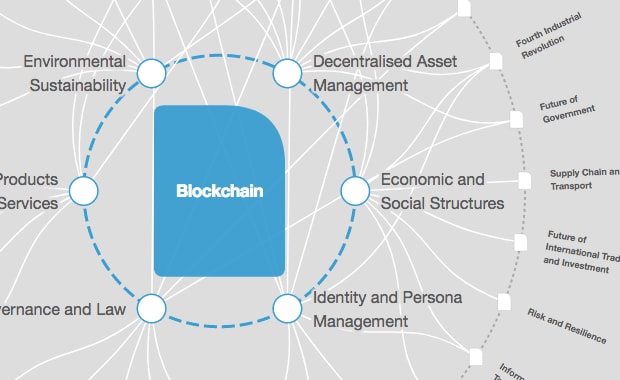How governments can leverage policy and blockchain technology to stunt public corruption

A new report looks at the feasibility and value of blockchain technology for public procurement. Image: Markus Spiske/Unsplash

Get involved with our crowdsourced digital platform to deliver impact at scale
Stay up to date:
Blockchain
- Corruption is prevalent in public procurement.
- The World Economic Forum partnered with the Inter-American Development Bank and Colombian Inspector General's office on the most comprehensive study of blockchain technology for public procurement and for public-sector corruption.
- Blockchain’s promise warrants cautious enthusiasm and thoughtful experimentation in this context.
Worldwide, governments devote an estimated $9.5 trillion each year to public procurement – an average of approximately 15% of national GDP. This money goes to public goods and services such as the construction of roads and the delivery of healthcare services, but also tends to line the pockets of corrupt government officials, corporate executives and others who are involved in the procurement process. The problem is almost universal.
Both the UN and the Organization for Economic Co-operation and Development (OECD) estimate that 10-30% of a public contract’s overall value is commonly lost to corruption. These numbers have led the World Bank to conclude that “curtailing procurement corruption may represent one of the most effective economic development programmes that a country can adopt.”
While the extent of procurement corruption varies from country to country, the causes are common: inadequate record keeping, low public accountability, repeat and close interactions between the private sector and government officials and centrally controlled processes. These combined factors create an opaque, complex and high-value process vulnerable to corruption.
The World Economic Forum’s new report, Exploring Blockchain Technology for Government Transparency: A Blockchain-Based Public Procurement System, is the most comprehensive study of the feasibility and value of blockchain technology for public procurement and for public-sector corruption in general.
The Forum has partnered with the Colombian Inspector General’s Office and the Inter-American Development Bank to create a public, permissionless Ethereum-based blockchain procurement system. (With technical advice from experts at blockchain security firm Quantstamp and UC Berkeley.)
The proof of concept, developed by engineers at the National University of Colombia, is designed to select vendors for Colombia’s school meals programme, Programa de Alimentación Escolar, which feeds low-income youth – and has become the centre of various corruption scandals in recent years involving exponentially inflated prices and non-delivery of tens of millions of meals.
The project’s goals are two-fold: to identify the value of blockchain for increasing transparency and accountability in public procurement, and to accelerate similar research and experimentation worldwide.
The scale and scope of procurement corruption is not new. Countries and localities have attempted to stymie this behaviour for years by codifying standards, prohibitions and formal processes, but this has often only raised the costs of corruption rather than fully deterring it. Weak rule of law or limited political will often stunt the efficacy of such measures.
Blockchain-based procurement offers governments the potential to disinfect – or de-corrupt – their procurement processes through “technologically induced sunlight”.
Blockchain enables permanent and tamper-evident record keeping, real-time transparency and auditability, and automated “smart contracts.” This increases uniformity, objectivity and transparency.
For instance, blockchain makes it more difficult to remove records of bids and public comments, or to alter bid or tender offers once submitted. This decentralizes decision-making, oversight and record-keeping, enhances transparency and devolves power away from authorities who might be prone to corruption.
The World Economic Forum-led proof of concept enables vendors and tenderers to conduct the vendor bidding and evaluation processes on the Ethereum blockchain, while also allowing third parties such as journalists and citizens to monitor and flag risky activity in real time. The software includes several automated features such as minimum bidding and public comment periods and automatic “red flags” to alert the Colombian Inspector General’s Office to potentially corrupt activity.

During the COVID-19 pandemic, many governments began emergency direct contracting to procure necessary health services and supplies. These contracts are particularly high risk as they are awarded very quickly in the absence of competitive auction. Next-generation electronic procurement systems, including those developed with blockchain, can record direct-contract activity in a permanent, secure and automated manner to potentially reduce corruption risk going forward.
Blockchain’s anti-corruption potential is enhanced when paired with an engaged audience. The Forum’s report emphasizes the importance of mobilizing people to become procurement monitors. Organizations like Partnership for Transparency Fund and Transparency International have developed models for “monitorships”, which can be adopted across the board or on a case-by-case basis.
How is the World Economic Forum promoting the responsible use of blockchain?
Blockchain is not an anti-corruption panacea. No technology, including blockchain, can eliminate corruption risk from certain human activities that occur outside the electronic platform, such as bribery or collusion. Cultural change, informed policy-making and sustained political buy-in are essential to meaningfully reduce corruption in procurement.
Despite the benefits, there are multiple challenges with fully public and permissionless blockchain networks like Ethereum.
The presence of cryptocurrencies can pose problems ranging from legal or regulatory roadblocks to unintentional exposure of vendors’ identities during anonymous bidding. Additionally, fully public and permissionless blockchains have limitations regarding transaction scalability, but this may be addressed by future technology developments or alternative configurations involving “private” or “hybrid” networks.
When it comes to public procurement, blockchain’s promise warrants cautious enthusiasm and thoughtful experimentation. The overarching goal of the Forum’s report is to provide hopeful yet realistic analysis of how blockchain can fill the current void in accountability and transparency in public procurement and it offers governments a technical framework for doing so.
Don't miss any update on this topic
Create a free account and access your personalized content collection with our latest publications and analyses.
License and Republishing
World Economic Forum articles may be republished in accordance with the Creative Commons Attribution-NonCommercial-NoDerivatives 4.0 International Public License, and in accordance with our Terms of Use.
The views expressed in this article are those of the author alone and not the World Economic Forum.
Related topics:
The Agenda Weekly
A weekly update of the most important issues driving the global agenda
You can unsubscribe at any time using the link in our emails. For more details, review our privacy policy.
More on BlockchainSee all
Scott Doughman
December 5, 2023
Shawn Dej and Sandra Waliczek
October 19, 2023
Scott Doughman
September 22, 2023







